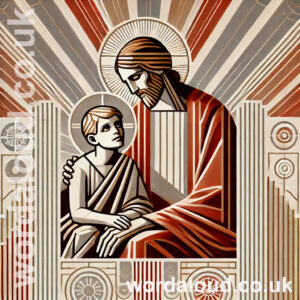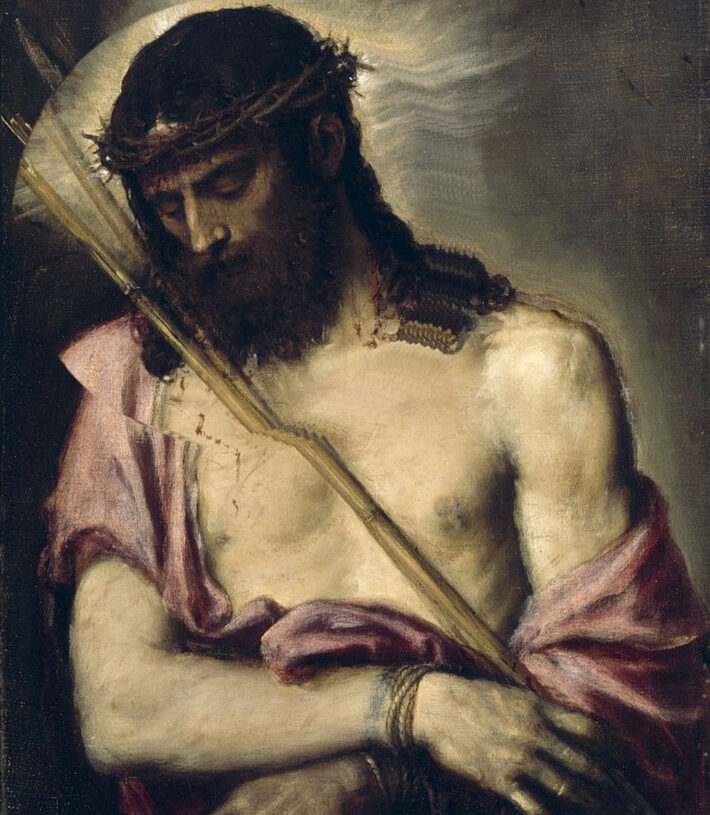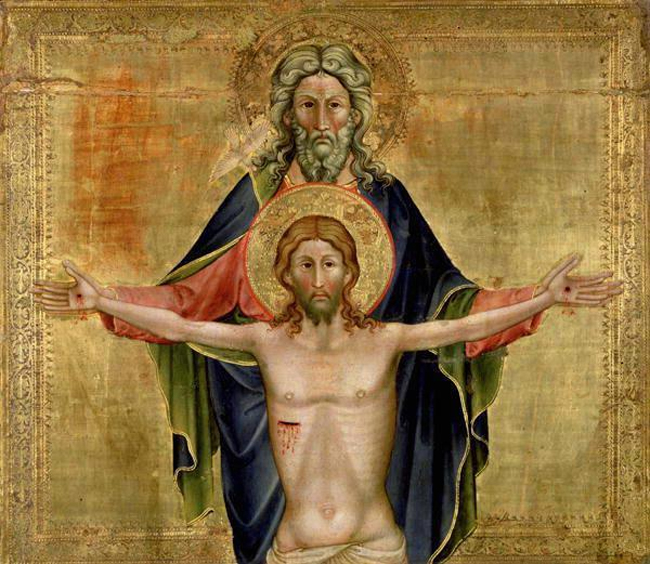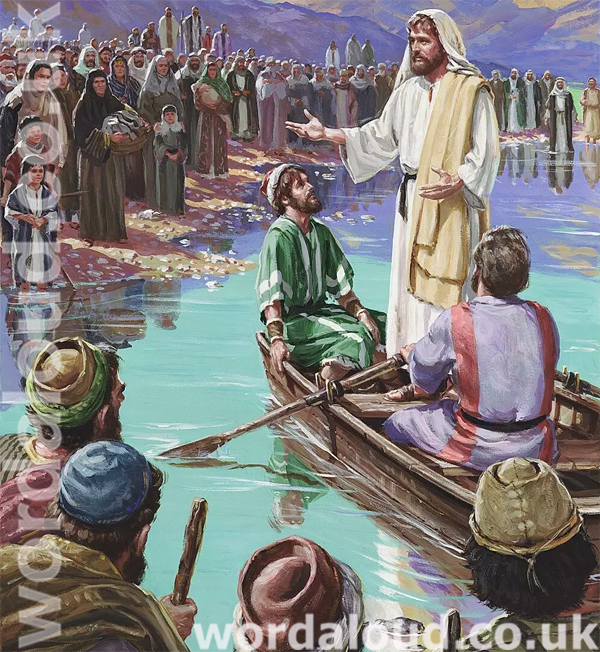Christian Art | Receive God As A Little Child
Mark 10: 35-45 – 29th Sunday Year B (Audio Bible KJV, Spoken Word)
35 ¶ And James and John, the sons of Zebedee, come unto him, saying, Master, we would that thou shouldest do for us whatsoever we shall desire.
36 And he said unto them, What would ye that I should do for you?
37 They said unto him, Grant unto us that we may sit, one on thy right hand, and the other on thy left hand, in thy glory.
38 But Jesus said unto them, Ye know not what ye ask: can ye drink of the cup that I drink of? and be baptized with the baptism that I am baptized with?
39 And they said unto him, We can. And Jesus said unto them, Ye shall indeed drink of the cup that I drink of; and with the baptism that I am baptized withal shall ye be baptized:
40 But to sit on my right hand and on my left hand is not mine to give; but it shall be given to them for whom it is prepared.
41 And when the ten heard it, they began to be much displeased with James and John.
42 But Jesus called them to him, and saith unto them, Ye know that they which are accounted to rule over the Gentiles exercise lordship over them; and their great ones exercise authority upon them.
43 But so shall it not be among you: but whosoever will be great among you, shall be your minister:
44 And whosoever of you will be the chiefest, shall be servant of all.
45 For even the Son of man came not to be ministered unto, but to minister, and to give his life a ransom for many.
Jesus has told his disciples about the Passion to come for the third time, as they journey to Jerusalem, and still this grizzly series of events, of mockery, scourging and death, is quite beyond the disciples’ comprehension. It is a great testimony to the apostles’ honesty and humility that, in recounting the Gospel, they do not seek to conceal their early weaknesses; these men chosen by Jesus have yet to be transformed through grace, to become the great pillars of the Church. Now further weakness is recalled, as the disciples reveal their ambition to have a powerful and prestigious position when the Kingdom comes.
Christ’s answer is mysterious: Can you drink the cup that I drink of, and be baptized with the baptism I am baptized with? The cross is to be the baptism from which our redemption in Christ flows. When we are baptized, we are baptized in Christ as he hung and died upon the cross, and in his resurrection. The cross is our baptism; it is at the heart of Christian faith. And, when we drink of the cup of Christ’s blood, as Christ is sacrificed again for us, we are once more at Calvary.
James and John, the sons of thunder, will indeed follow Christ in terms of their martyrdom. They and the other disciples have, though, an intermediate lesson to learn, which is about service. The Kingdom of God, which with Jesus is actually here in our lives now, is unlike any earthly kingdom – or republic, or ‘democratic state of…’. Indeed, it turns the power relationships of the secular world on their head. The disciples hear the word ‘kingdom’ and they see power, authority, rich living, those who have versus those who have not, and they want a piece of that, on the rich side. Throughout the Gospels, the Acts, the letters, throughout the Bible, we are asked again and again to re-imagine our relationship with God and our fellow human beings. We are called to reject the allure of transient riches and to dedicate ourselves to love and service. This is the Christian way.
Almighty, ever-living God, make us ever obey you willingly and promptly. Teach us how to serve you with sincere and upright hearts in every sphere of life.
Give to Caesar the things that belong to Caesar, and to God the things that belong to God, alleluia.
![]()

Audio Bible KJV | Endnotes
Receive God As A Little Child
Jesus teaches that we should receive God as a little child, with humility and a willingness to learn. Jesus tells us that the kingdom of God belongs to such as these.
Jesus emphasizes the importance of humility and childlike faith in our relationship with God. We must come to God with the innocence and trust of a child, willing to learn and grow in our faith.
In the Bible, we see examples of childlike faith. In Luke 18:15-17, people were bringing their babies to Jesus so that Jesus could touch them, but the disciples rebuked them. Jesus responds by saying: ‘Suffer little children to come unto me, and forbid them not: for of such is the kingdom of God. Verily I say unto you, Whosoever shall not receive the kingdom of God as a little child shall in no wise enter therein.’
The Gospel verses show us that children have a unique faith that we should aspire to. They are innocent, trusting, and wholly dependent on their parents. We should come to God with the same faith, fully trusting in God’s love and provision for us.
The concept of humility and servitude is echoed throughout the Bible. In Philippians 2:3-4, Saint Paul writes: ‘Let nothing be done through strife or vainglory, but in lowliness of mind let each esteem other better than themselves. Look not every man on his own things, but every man also on the things of others.’ Here, Saint Paul encourages us to put others before ourselves and to have a humble attitude towards one another.
In John 13:14-15, Jesus sets an example of servant leadership by washing his disciples’ feet. Jesus says: ‘If I then, your Lord and Master, have washed your feet; ye also ought to wash one another’s feet. For I have given you an example, that ye should do as I have done to you.’ These Gospel verses illustrate the importance of serving others and putting their needs before our own.
Many Christians have emphasized the importance of humility and servitude in our relationship with God. Saint Augustine once said: ‘It was pride that changed angels into devils; it is humility that makes men as angels.’ Similarly, Saint Francis of Assisi said: ‘Lord, make me an instrument of thy peace. Where there is hatred, let me sow love. Where there is injury, pardon; where there is doubt, faith; where there is despair, hope; where there is darkness, light; and where there is sadness, joy.’
This Thought Of Receiving God With Childlike Faith Is To Be Found In The Old Testament
Psalm 131:1-2 – ascribed to King David: ‘LORD, my heart is not haughty, nor mine eyes lofty: neither do I exercise myself in great matters, or in things too high for me. Surely I have behaved and quieted myself, as a child that is weaned of his mother: my soul is even as a weaned child.’ Here, David illustrates the importance of a humble and quiet spirit before God, much like a weaned child that is content and dependent on its mother.
Proverbs 3:5-6 – ascribed to King Solomon: ‘Trust in the LORD with all thine heart; and lean not unto thine own understanding. In all thy ways acknowledge him, and he shall direct thy paths.’ This passage emphasizes the importance of trust and dependence on God, much like a child trusts and depends on their parent.
In Isaiah 66:13, we read: ‘As one whom his mother comforteth, so will I comfort you.’ Here, God compares His love and care for His people to that of a mother’s love for her child, emphasizing the childlike trust and dependence that we should have in Him.
In Isaiah 40:11, we read: ‘He shall feed his flock like a shepherd: he shall gather the lambs with his arm, and carry them in his bosom, and shall gently lead those that are with young.’ Here, God is depicted as a loving shepherd who tenderly cares for his flock, carrying the lambs in his arms much like a parent carrying a child.
In Jeremiah 1:6-7, we read: ‘Then said I, Ah, Lord GOD! behold, I cannot speak: for I am a child. But the LORD said unto me, Say not, I am a child: for thou shalt go to all that I shall send thee, and whatsoever I command thee thou shalt speak.’ In this passage, we see that God chooses to use even a young and seemingly inexperienced prophet like Jeremiah for His purposes.
In Ezekiel 16:8, we read: ‘Now when I passed by thee, and looked upon thee, behold, thy time was the time of love; and I spread my skirt over thee, and covered thy nakedness: yea, I sware unto thee, and entered into a covenant with thee, saith the Lord GOD, and thou becamest mine.’ Here, God describes His relationship with His people as one of a loving and protective parent, spreading His skirt over them like a mother would cover her child.
In Hosea 11:1-4, we read: ‘When Israel was a child, then I loved him, and called my son out of Egypt. As they called them, so they went from them: they sacrificed unto Baalim, and burned incense to graven images. I taught Ephraim also to go, taking them by their arms; but they knew not that I healed them. I drew them with cords of a man, with bands of love: and I was to them as they that take off the yoke on their jaws, and I laid meat unto them.’ Here, God describes His relationship with Israel as that of a parent, teaching and guiding them in love, despite their disobedience and unfaithfulness.
In summary, the Old Testament emphasizes the importance of childlike faith, humility, and dependence on God. We see these traits exemplified in the lives of biblical figures such as David, who had a quiet and humble spirit before God, and in the Proverbs, which encourage us to trust in the Lord with all our heart and not lean on our own understanding. We also see God depicted as a loving and protective parent, carrying His children in His arms and guiding them with cords of love.
Here are six more examples of the theme of childlike faith in God in the Old Testament:
- In 2 Chronicles 20:12, King Jehoshaphat prays to God before a great battle, saying: ‘O our God, wilt thou not judge them? for we have no might against this great company that cometh against us; neither know we what to do: but our eyes are upon thee.’ Here, we see Jehoshaphat acknowledging his own weakness and dependence on God.
- In Job 1:20-21, Job responds to the news of his great losses with these words: ‘Naked came I out of my mother’s womb, and naked shall I return thither: the LORD gave, and the LORD hath taken away; blessed be the name of the LORD.’ Job’s response is an example of a childlike trust in God’s sovereignty and goodness, even in the face of great suffering.
- In the book of Ruth, we see the character of Ruth exemplifying childlike humility and trust. When she decides to follow her mother-in-law Naomi back to Israel, she says: ‘Intreat me not to leave thee, or to return from following after thee: for whither thou goest, I will go; and where thou lodgest, I will lodge: thy people shall be my people, and thy God my God’ (Ruth 1:16). Ruth’s words show a humble submission to God and a willingness to trust in His plan, even when it involves great uncertainty.
- In the book of Daniel, we see the young prophet Daniel and his friends exemplifying childlike faith in God’s power and provision. When faced with the prospect of being thrown into a fiery furnace for refusing to worship the Babylonian king’s idol, they declare: ‘If it be so, our God whom we serve is able to deliver us from the burning fiery furnace, and he will deliver us out of thine hand, O king. But if not, be it known unto thee, O king, that we will not serve thy gods, nor worship the golden image which thou hast set up.’ (Daniel 3:17-18) Their words show a humble submission to God’s will and a trust in His power to save them.
- In the book of Esther, we see the character of Esther exemplifying childlike obedience and dependence on God. When faced with the prospect of approaching the Persian king without being summoned, she says: ‘Go, gather together all the Jews that are present in Shushan, and fast ye for me, and neither eat nor drink three days, night or day: I also and my maidens will fast likewise; and so will I go in unto the king, which is not according to the law: and if I perish, I perish.’ (Esther 4:16) Esther’s words show a willingness to obey God’s call, even when it involves great risk and uncertainty.

The Sign Of The Child In The Gospels
In the Gospels, Jesus uses the sign or symbol of the child to teach important lessons about the nature of God’s kingdom and the kind of faith that is required to enter it. Here are two additional examples:
- In Matthew 18:1-5, the disciples come to Jesus and ask: ‘Who is the greatest in the kingdom of heaven?’ Jesus responds by calling a little child to him and saying: ‘Verily I say unto you, Except ye be converted, and become as little children, ye shall not enter into the kingdom of heaven. Whosoever therefore shall humble himself as this little child, the same is greatest in the kingdom of heaven.’ Here, we see Jesus using the symbol of the child to teach about the importance of humility, simplicity, and trust in entering God’s kingdom.
- In Mark 10:13-16, people bring children to Jesus so that he might bless them, but the disciples rebuke them. Jesus responds by saying: ‘Suffer the little children to come unto me, and forbid them not: for of such is the kingdom of God. Verily I say unto you, Whosoever shall not receive the kingdom of God as a little child, he shall not enter therein.’ Here, we see Jesus using the symbol of the child to teach that those who want to enter God’s kingdom must receive it with childlike trust and openness.
By calling his disciples to become like little children, Jesus teaches that the kingdom of God is not for those who are proud, self-sufficient, or worldly-wise, but for those who are willing to trust and follow Jesus with childlike faith.








